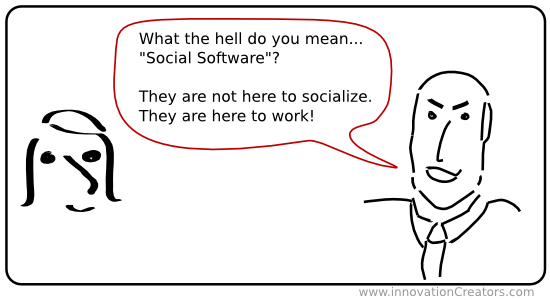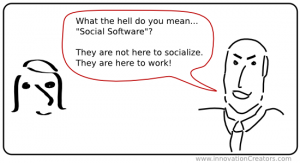The Wired Wiki experiment is over – the collective result of 25 ad-hoc “editors” is now published on Wired News: Veni, Vidi, Wiki
Was the experiment a success? I think the process itself was, but not necessarily the end result. After the LA Times Wikitorial fiasco the very fact that for a week civility reigned and no wiki-war broke out is a success, as both journalist Ryan Syngel and wiki-host Ross Mayfield confirm. But of course measuring success simply by the peaceful nature of the editing process means significantly lowering the bar… how about the result, the actual article? Ryan’s take:
Is it a better story than the one that would have emerged after a Wired News editor worked with it?
I think not.
The edits over the week lack some of the narrative flow that a Wired News piece usually contains. The transitions seem a bit choppy, there are too many mentions of companies, and too much dry explication of how wikis work.
In other words, it’s more an encyclopedia entry than an article, concludes Mathew Ingram: is has a lot of information (perhaps too much), but it lacks personality. Ironically, other than the different styles of the individuals editors, the desire for a successful experiment may have contributed to the outcome. After a few revisions you reach a point where the article can’t be improved by simply adding lines – some parts should be deleted, others my not feel correctly structured.
Personally I’ve been struggling with adding an idea on the organizational/human factor in a corporate environment, which logically would belong under the “Wiki while you work” heading, except that someone already started the thought under “When wikis fail”. Should I disturb what’s there, or stick my piece in the wrong place? I suppose most editors faced similar conflicts, and compromised in order to avoid starting a wiki-war – but that’s a compromise on the quality of the final article. (note: I ended up restructuring the two paragraphs).
Mike Cannon-Brookes hits the nail on the head pointing out the role of incentives:
I’d say simply that the interests of the parties are misaligned. Ryan wants the article to say something about the wiki world. Wiki vendors want a link from Wired.com. Certainly, wiki vendors want it to be an accurate piece – but they also want it to be an accurate piece with them in it. Amusingly, the recent changes page reads like a whose who of the wiki world.
This misalignment of incentives leads to bloated, long lists of links. The article trends towards becoming a directory of wiki vendors, not a piece of simple, insightful journalism.
Collaboration works best if there is a common purpose. Wikis shine when it’s not the discussion, individual comments that matter, but the synthesis of the collective wisdom.
Where else could the interest of all parties best aligned than in the workplace? As Jerry Bowles correctly points out, social media in a corporate environment is very different from social media in the public web. After the initial “grassroots movement”, if management fully embraces the wiki not as an optional, after-the-fact knowledge-sharing tool, but the primary facility to conduct work, it becomes the fabric of everyday business, is used by people of real identities and reputations, and most importantly shared objectives.
This is why Nick Carr is so wrong in Web 2.0’s numbskull factor. He supports Harvard Prof. Andrew McAfee‘s point of extrapolating the low contributor/reader ratio of Wikipedia into the corporate world and concluding that fractional participation will result in the failure of social tools. He goes a step further though:
“In fact, the quality of the product hinges not just, or even primarily, on the number of contributors. It also hinges on the talent of the contributors – or, more accurately, on the talent of every individual contributor. No matter how vast, a community of mediocrities will never be able to produce anything better than mediocre work. Indeed, I would argue that the talent of the contributors is in the end far more important to quality than is the number of contributors. Put 5,000 smart people to work on a wiki, and they’ll come up with something better than a wiki created by a million numbskulls.”
This is actually reasonably good logic, with one major flaw: it takes the Wikipedia example too far. A wiki in the Enterprise is not an encyclopedia; not even some esoteric Knowledge Management tool. In fact, even though wikis solve a Knowledge Management problem (lack of input and GIGO), they should not be considered KM tools at all at the workplace. Typical KM is concerned with the collection, organization and redistribution of knowledge after-the-fact, while the wiki becomes the primary platform to conduct everyday business tasks, and resolves the KM-problem as a by-product.
Update (6/15/08): Now we have pretty good terms to describe the above, instead of my lengthy explanation. See the discussion on In-the-Flow and Above-the-Flow wikis by Michael Idinopulos and Ross Mayfield.
I have news for Nick: not everyone can be in the top 20% of the corporate workforce – by definition *somebody* will have to belong to that *other* 80%. Are they all numbskulls? So be it.. that is your workforce, like it or not. With the elitist KM view Nick would actually be right:
“As earlier knowledge-management failures have shown, the elite often have the least incentive to get involved, and without them, the project’s doomed.”
True. Except when the wiki is the primary work / collaboration platform, participation is no longer optional. Not when the answer to almost any question is “it’s on the wiki.” A basic conclusion that even the numbskull-editors of the Wired article have recognized.
Update (9/7): I love Rod‘s cartoons:




 Well, maybe you shouldn’t. Let me rephrase the original statement: Wikis have arrived when …you don’t even have to know what they are to use one. You don’t have to know you’re using a wiki, just happily type away, creating shareable content on the Web. This just became possible on Monday, with the launch of
Well, maybe you shouldn’t. Let me rephrase the original statement: Wikis have arrived when …you don’t even have to know what they are to use one. You don’t have to know you’re using a wiki, just happily type away, creating shareable content on the Web. This just became possible on Monday, with the launch of  You Know Wikis Have Arrived When …. they become the feature post in your regular junk mail – this time from an Executive Recruiter firm:
You Know Wikis Have Arrived When …. they become the feature post in your regular junk mail – this time from an Executive Recruiter firm:


 – otherwise a digg-like voting system would make more sense.
– otherwise a digg-like voting system would make more sense. the open community at large, too.
the open community at large, too.
Recent Comments